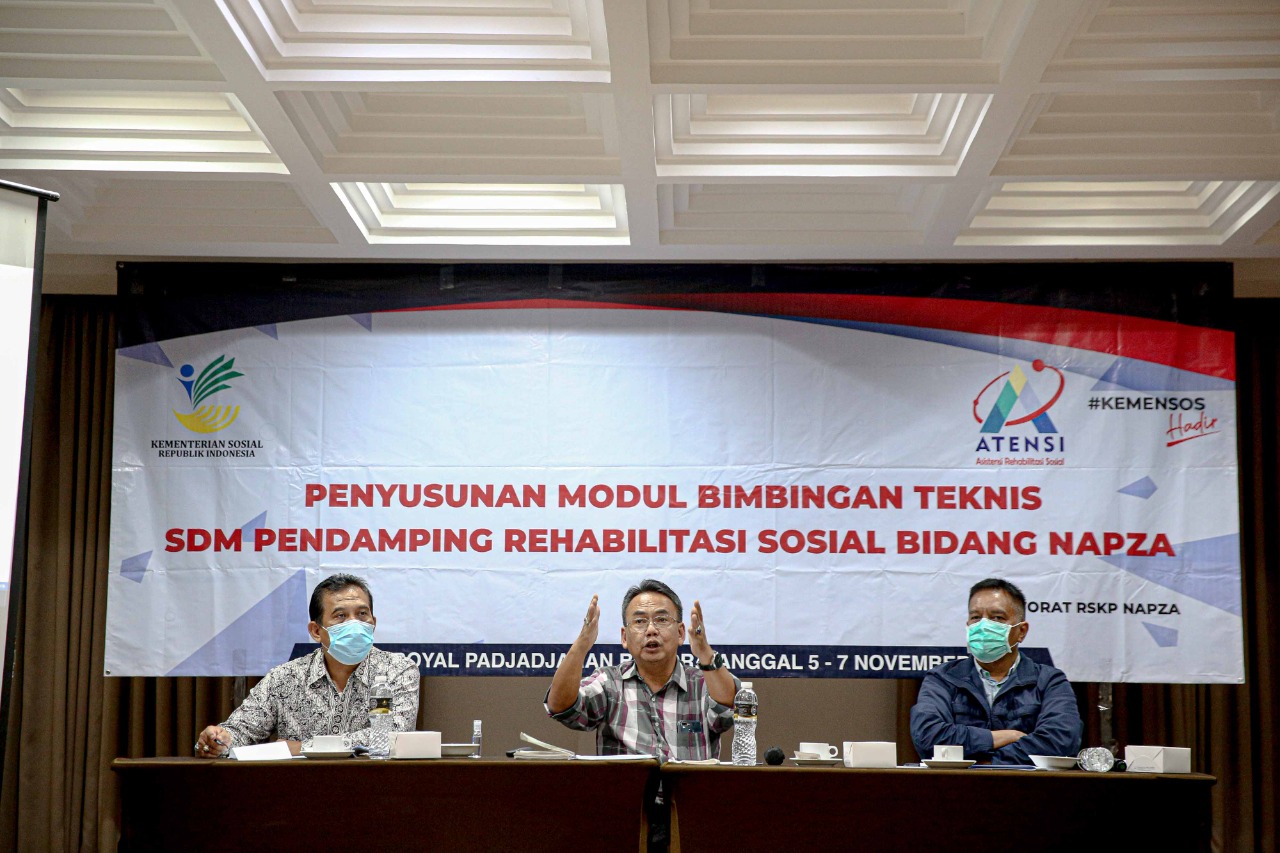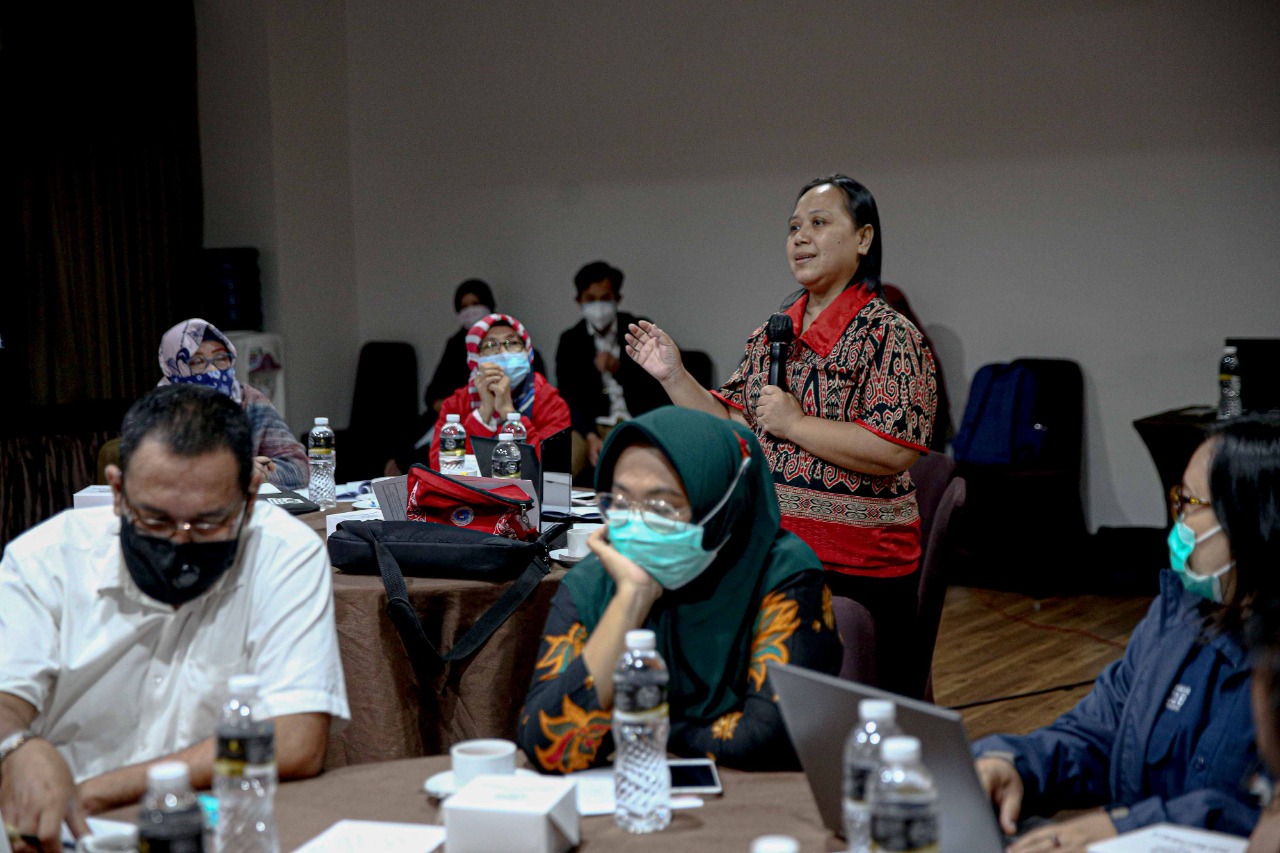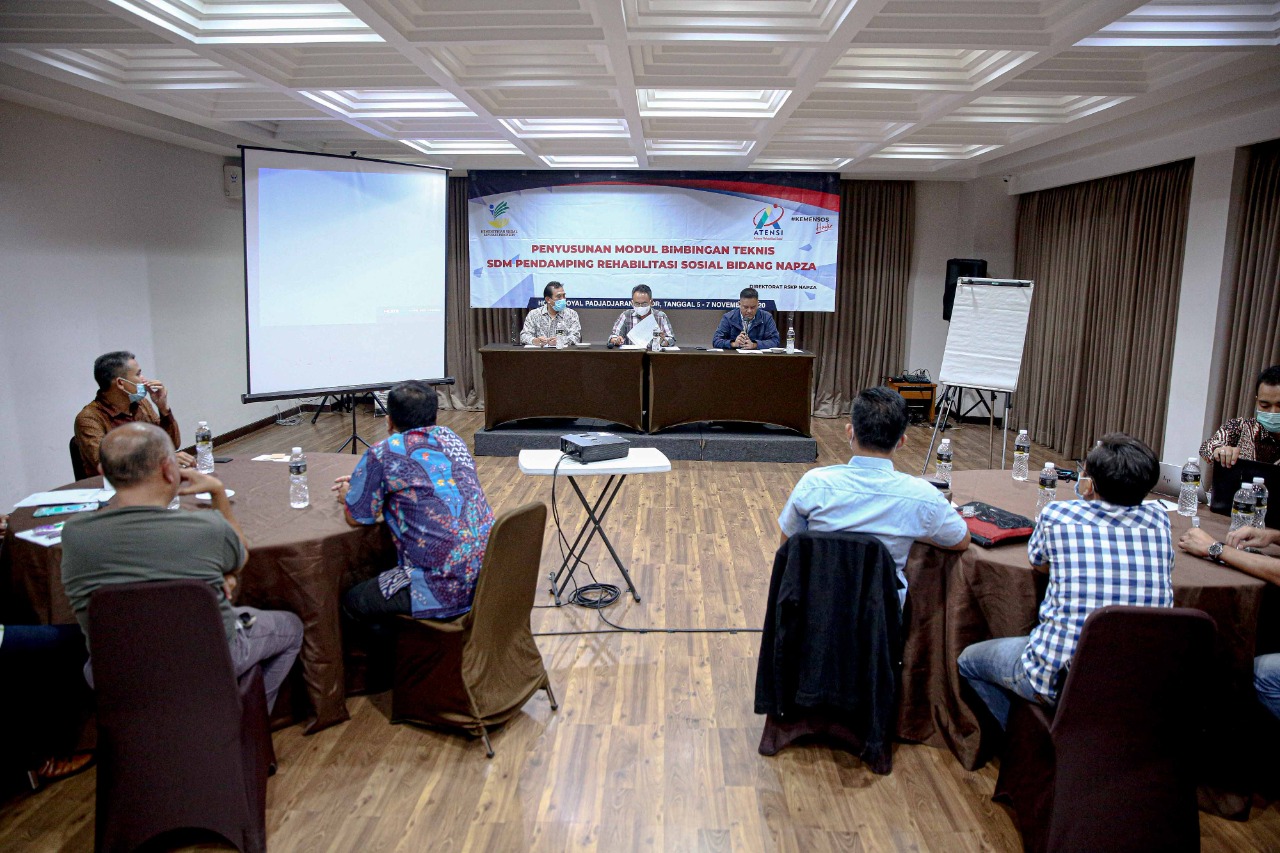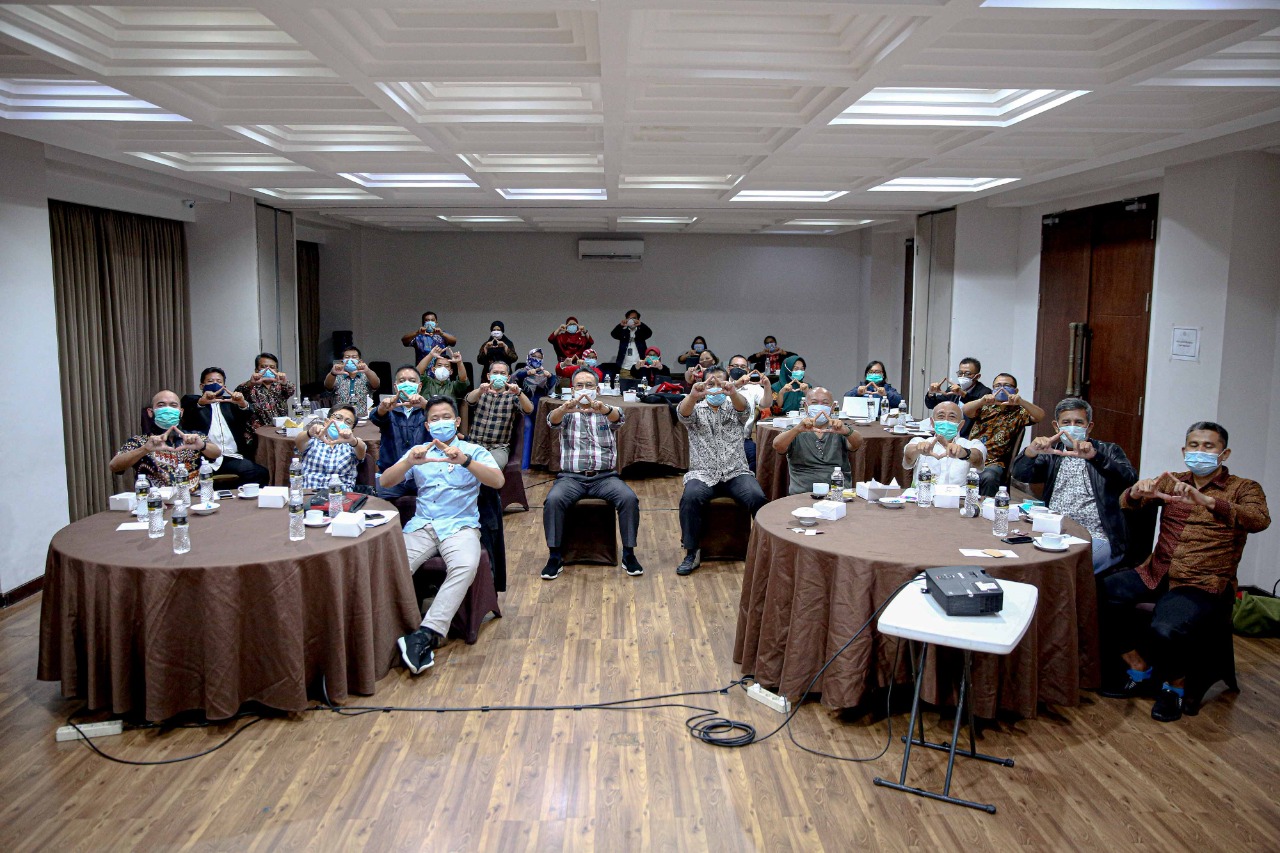Writer :
OHH Ditjen Rehsos
Editor :
Annisa YH
Translator :
Intan Qonita N
BOGOR (November 5, 2020) - The Indonesian Ministry of Social Affairs is still compiling a technical guidance module for Human Resources (HR) companion for social rehabilitation in the drug sector.
In preparing the module, the Indonesian Ministry of Social Affairs collaborated with a number of experts and experienced parties in the field of narcotics and illegal drugs.
The Director General of Social Rehabilitation of the Indonesian Ministry of Social Affairs, Harry Hikmat, said that HR companions for social rehabilitation in the narcotics and illegal drugs sector must be prepared to become experts.
"First, we have to make sure first that the competence of human resources will be achieved through capacity levels. Both technical guidance and standardized training," said Harry, as he is known, at the activity 'The Preparation of the Technical Guidance Module for Social Rehabilitation Assistants in Narcotics and Illegal Drugs Sector' in Bogor, West Java, Thursday (5/11/2020) night.
"After we know and realize, in HR that handles narcotics and illegal drugs, it is necessary to comply with the Indonesian National Work Competency Standards (SKKNI)," he continued.
Even so, addiction counselors from the Indonesian Ministry of Social Affairs have made a pilot establishing the SKKNI.
"Even from level one to nine. It means that if we compare it with functional positions, it can reach at least 4C, that is middle (level)," he added.
"It can even be pushed to 'expert' but with a record that there is a scientific basis. Well, coincidentally at the Ministry of Social Affairs there is a social rehabilitation study program," Harry continued.
He explained that if the human resources in the drug sector became experts, it would be the best thing for the drug victim and the counselor.
"If it's there, this means it can be up to nine maximum. So up to the expert level, this is for counsellors," said Harry, who was wearing glasses.
In preparing the module, the Indonesian Ministry of Social Affairs collaborated with a number of experts and experienced parties in the field of narcotics and illegal drugs.
The Director General of Social Rehabilitation of the Indonesian Ministry of Social Affairs, Harry Hikmat, said that HR companions for social rehabilitation in the narcotics and illegal drugs sector must be prepared to become experts.
"First, we have to make sure first that the competence of human resources will be achieved through capacity levels. Both technical guidance and standardized training," said Harry, as he is known, at the activity 'The Preparation of the Technical Guidance Module for Social Rehabilitation Assistants in Narcotics and Illegal Drugs Sector' in Bogor, West Java, Thursday (5/11/2020) night.
"After we know and realize, in HR that handles narcotics and illegal drugs, it is necessary to comply with the Indonesian National Work Competency Standards (SKKNI)," he continued.
Even so, addiction counselors from the Indonesian Ministry of Social Affairs have made a pilot establishing the SKKNI.
"Even from level one to nine. It means that if we compare it with functional positions, it can reach at least 4C, that is middle (level)," he added.
"It can even be pushed to 'expert' but with a record that there is a scientific basis. Well, coincidentally at the Ministry of Social Affairs there is a social rehabilitation study program," Harry continued.
He explained that if the human resources in the drug sector became experts, it would be the best thing for the drug victim and the counselor.
"If it's there, this means it can be up to nine maximum. So up to the expert level, this is for counsellors," said Harry, who was wearing glasses.
"Meanwhile for social workers, there are already levels three to nine. Standardization is important to determine competence according to qualifications," he continued.
According to Harry, HR who work on social rehabilitation of drug victims must have a license.
"People who work in social rehabilitation for drug victims must have a recognized license, based on a competency test because they are certified," he said.
"Therefore, increasing the capacity of human resources must also pay attention to making certified training so that it can be part of a functional career development," Harry continued.
He hopes that the increase in human resources in the drug sector can run well so that it is beneficial for the country, especially families and drug victims.
"We hope this is inline or in line with functional positions in the drug sector. If it is certified, there is already a quality guarantee for the services provided by someone based on the profession in the field of addiction counselors," said Harry.
"Besides that there are also social workers, it's also at a higher level to carry out social work practices in improving social functioning," continued Harry.
Once again, said Harry, if the SKKNI has been established, there are two qualifications of an addiction counselor.
"Yes, we hope that if the SKKNI has been established, there will be qualifications from addiction counselors and qualifications from social workers," he explained.
"So there are already Social Workers; Youth Social Worker, Middle Social Worker, and Expert Social Worker. Now, in Addiction Social Worker Workforce, we also an build Youth Addiction Social Worker, Middle Addiction Social Worker, and Expert Addiction Social Worker. However, now it is still in the Middle Addiction Social Worker stage," he continued.
According to Harry, HR who work on social rehabilitation of drug victims must have a license.
"People who work in social rehabilitation for drug victims must have a recognized license, based on a competency test because they are certified," he said.
"Therefore, increasing the capacity of human resources must also pay attention to making certified training so that it can be part of a functional career development," Harry continued.
He hopes that the increase in human resources in the drug sector can run well so that it is beneficial for the country, especially families and drug victims.
"We hope this is inline or in line with functional positions in the drug sector. If it is certified, there is already a quality guarantee for the services provided by someone based on the profession in the field of addiction counselors," said Harry.
"Besides that there are also social workers, it's also at a higher level to carry out social work practices in improving social functioning," continued Harry.
Once again, said Harry, if the SKKNI has been established, there are two qualifications of an addiction counselor.
"Yes, we hope that if the SKKNI has been established, there will be qualifications from addiction counselors and qualifications from social workers," he explained.
"So there are already Social Workers; Youth Social Worker, Middle Social Worker, and Expert Social Worker. Now, in Addiction Social Worker Workforce, we also an build Youth Addiction Social Worker, Middle Addiction Social Worker, and Expert Addiction Social Worker. However, now it is still in the Middle Addiction Social Worker stage," he continued.
Harry emphasized that these are two mutually reinforcing professions.
Regarding the technical guidance module for human resources assistants for social rehabilitation in the drug sector, the source is already in the IPWL (Mandatory Reporting Recipient Institution).
"Actually, addiction counselors already have the resources at IPWL. Because IPWL's requirements have an addiction counselor element," said Harry.
"So that when he comes to report himself, for example, there must be assistance and reinforcement and there is a process of motivation, counseling, there are problems he faces when he is in the rehabilitation process, either at home, in the center, or in an orphanage," Harry continued.
However, Harry explained that it was the competency standard that needed to be built.
"It's clear that the availability of addiction counselors already exists, it's just that we need to build competency standards so they can also improve," he said.
"So, it's not just the basic level, actually the addiction counselor process has been running in Padang Education and Training, among others, it's been two generations. Now that's for competency standardization, it's still at the basic level. Young addiction counselors," he continued.
He added, if the guidance module is completed, it can be used by anyone.
"The module will be used later, of course for the Ministry of Social Affairs. It even becomes a reference for competency certification. That's the benefit," explained Harry.
"It needs to be compiled together with experts and those who are already working in the drug sector, hopefully this module can also be used together with them," concluded Harry.
Program Officer of the United Nations Office on Drugs and Crime (UNODC), Narendra Narotama, stated that the preparation of the module had referred to international standards.
"My response is that this is indeed the direction towards international standards. Because we are UNODC, based on our mandate, we are setting up international standards for drug or drug rehabilitation that must be followed by all member countries," he said, on the same occasion.
"With this initiative, especially the policy from the Director General of the Ministry of Social Affairs, with the important program of ATENSI, this is already referring to international standards. We welcome and fully support this program," he concluded.
The participants were 25 representatives from National Narcotics Board, Social Welfare Education and Training Center, Mandatory Reporting Recipient Institution (IPWL), Indonesian Addiction Counselors Association (IKAI), Drug Abuse Victims Social Rehabilitation Foundation, Social Rehabilitation for Drug Abuse Victims (RSKPN) Directorate, Inspector General, and Social Rehabilitation Center for Drug Abuse Victims (BRSKPN).
"So that when he comes to report himself, for example, there must be assistance and reinforcement and there is a process of motivation, counseling, there are problems he faces when he is in the rehabilitation process, either at home, in the center, or in an orphanage," Harry continued.
However, Harry explained that it was the competency standard that needed to be built.
"It's clear that the availability of addiction counselors already exists, it's just that we need to build competency standards so they can also improve," he said.
"So, it's not just the basic level, actually the addiction counselor process has been running in Padang Education and Training, among others, it's been two generations. Now that's for competency standardization, it's still at the basic level. Young addiction counselors," he continued.
He added, if the guidance module is completed, it can be used by anyone.
"The module will be used later, of course for the Ministry of Social Affairs. It even becomes a reference for competency certification. That's the benefit," explained Harry.
"It needs to be compiled together with experts and those who are already working in the drug sector, hopefully this module can also be used together with them," concluded Harry.
Program Officer of the United Nations Office on Drugs and Crime (UNODC), Narendra Narotama, stated that the preparation of the module had referred to international standards.
"My response is that this is indeed the direction towards international standards. Because we are UNODC, based on our mandate, we are setting up international standards for drug or drug rehabilitation that must be followed by all member countries," he said, on the same occasion.
"With this initiative, especially the policy from the Director General of the Ministry of Social Affairs, with the important program of ATENSI, this is already referring to international standards. We welcome and fully support this program," he concluded.
The participants were 25 representatives from National Narcotics Board, Social Welfare Education and Training Center, Mandatory Reporting Recipient Institution (IPWL), Indonesian Addiction Counselors Association (IKAI), Drug Abuse Victims Social Rehabilitation Foundation, Social Rehabilitation for Drug Abuse Victims (RSKPN) Directorate, Inspector General, and Social Rehabilitation Center for Drug Abuse Victims (BRSKPN).
Share :
 English
English
 Bahasa
Bahasa




